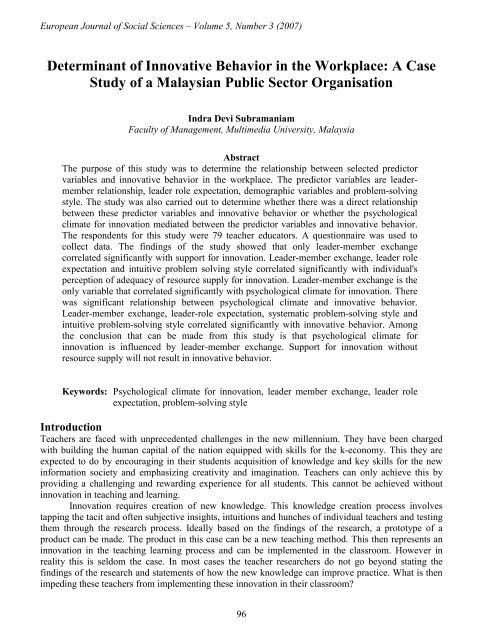european journal of social sciences issn: 1450-2267 - EuroJournals
european journal of social sciences issn: 1450-2267 - EuroJournals
european journal of social sciences issn: 1450-2267 - EuroJournals
You also want an ePaper? Increase the reach of your titles
YUMPU automatically turns print PDFs into web optimized ePapers that Google loves.
European Journal <strong>of</strong> Social Sciences – Volume 5, Number 3 (2007)<br />
Determinant <strong>of</strong> Innovative Behavior in the Workplace: A Case<br />
Study <strong>of</strong> a Malaysian Public Sector Organisation<br />
Indra Devi Subramaniam<br />
Faculty <strong>of</strong> Management, Multimedia University, Malaysia<br />
Abstract<br />
The purpose <strong>of</strong> this study was to determine the relationship between selected predictor<br />
variables and innovative behavior in the workplace. The predictor variables are leadermember<br />
relationship, leader role expectation, demographic variables and problem-solving<br />
style. The study was also carried out to determine whether there was a direct relationship<br />
between these predictor variables and innovative behavior or whether the psychological<br />
climate for innovation mediated between the predictor variables and innovative behavior.<br />
The respondents for this study were 79 teacher educators. A questionnaire was used to<br />
collect data. The findings <strong>of</strong> the study showed that only leader-member exchange<br />
correlated significantly with support for innovation. Leader-member exchange, leader role<br />
expectation and intuitive problem solving style correlated significantly with individual's<br />
perception <strong>of</strong> adequacy <strong>of</strong> resource supply for innovation. Leader-member exchange is the<br />
only variable that correlated significantly with psychological climate for innovation. There<br />
was significant relationship between psychological climate and innovative behavior.<br />
Leader-member exchange, leader-role expectation, systematic problem-solving style and<br />
intuitive problem-solving style correlated significantly with innovative behavior. Among<br />
the conclusion that can be made from this study is that psychological climate for<br />
innovation is influenced by leader-member exchange. Support for innovation without<br />
resource supply will not result in innovative behavior.<br />
Keywords: Psychological climate for innovation, leader member exchange, leader role<br />
expectation, problem-solving style<br />
Introduction<br />
Teachers are faced with unprecedented challenges in the new millennium. They have been charged<br />
with building the human capital <strong>of</strong> the nation equipped with skills for the k-economy. This they are<br />
expected to do by encouraging in their students acquisition <strong>of</strong> knowledge and key skills for the new<br />
information society and emphasizing creativity and imagination. Teachers can only achieve this by<br />
providing a challenging and rewarding experience for all students. This cannot be achieved without<br />
innovation in teaching and learning.<br />
Innovation requires creation <strong>of</strong> new knowledge. This knowledge creation process involves<br />
tapping the tacit and <strong>of</strong>ten subjective insights, intuitions and hunches <strong>of</strong> individual teachers and testing<br />
them through the research process. Ideally based on the findings <strong>of</strong> the research, a prototype <strong>of</strong> a<br />
product can be made. The product in this case can be a new teaching method. This then represents an<br />
innovation in the teaching learning process and can be implemented in the classroom. However in<br />
reality this is seldom the case. In most cases the teacher researchers do not go beyond stating the<br />
findings <strong>of</strong> the research and statements <strong>of</strong> how the new knowledge can improve practice. What is then<br />
impeding these teachers from implementing these innovation in their classroom?<br />
96

















